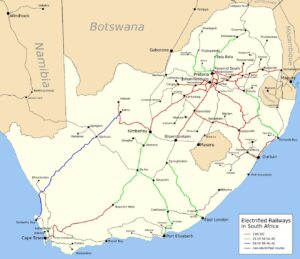The Broad-Based Black Economic Empowerment (B-BBEE) policy in South Africa began after the end of apartheid and was formulated to correct the economic inequality left over from history. After the democratization of South Africa in 1994, the government gradually promoted the economic empowerment of black people. The Broad Black Economic Empowerment Act (B-BBEE Act No.53 of 2003) was passed in 2003, which was the framework legislation of the BEE policy. The aim of this bill is to promote economic transformation, enable blacks to participate more widely in ownership, management and economic activities, and increase the intensity of skills training. The bill authorizes the Minister of Industry and Trade to issue the “Codes of Good Practice”, clearly defining the measurement standards and five key elements (see below), and formulating specific guidelines based on industries. The B-BBEE Act was revised in 2013 (came into effect in 2015), and the guidelines have been constantly updated to strengthen implementation. Overall, the BEE policy aims to create a fair competitive environment, encourage enterprises to give priority to hiring and supporting the black community, provide opportunities for black ownership and community development, and at the same time obtain preferential policies in government procurement and other aspects.
Scoring system and elements
BEE in South Africa uses the scorecard system to evaluate enterprises. The scoring card consists of five major elements with a total score of 105 points. The elements and their weights are as follows:
| Element | Weight (full marks) | Explanation |
| Ownership | 25 | Measure the actual economic equity value of black shareholders (including net share value and voting rights); The higher the proportion, the higher the score. |
| Management control | 15 | Evaluate the proportion of black people in management positions such as senior executives and the board of directors. |
| Skill development | 20 | Based on the enterprise’s investment in training and talent cultivation for black employees (scholarships, apprentices, training fees, etc.). |
| Enterprise and supplier development | 40(Including three subordinate items) | Measure the support for black enterprises: – Enterprise development (ED, 5 points) : Investment in black business owners or entrepreneurial projects; – Supplier Development (SD, 10 points) : Provide assistance such as funds, equipment, and technical training to black suppliers; – Priority Procurement (PP, 25 points) : The proportion of procurement expenditure for products from BEE-certified suppliers. |
| Socio-economic Development (SED) | 5 | Corporate social responsibility investment in the black community, such as poverty alleviation projects and community development donations, etc. |
| Total | 105 |
According to the scoring rules, the scores obtained by enterprises in the above elements are added together to obtain the total score, which then corresponds to different BEE levels and government procurement recognition degrees (Level1 – Level8). During the scoring process, some items have minimum compliance requirements (for example, large enterprises must reach 40% of the target for elements such as equity, skill development, and enterprise and supplier development; otherwise, the grade will be deducted). For example, the ownership element is scored based on the proportion of shares owned by blacks and their net worth. The management control element examines the composition of black people in the company’s board of directors and senior management. The elements of skill development are given corresponding scores based on the training budget that accounts for a certain proportion of the salary. The enterprise/supplier development factors comprehensively calculate the proportion of direct funding to black enterprises and procurement from BEE suppliers. Through these indicators, rating agencies verify the BEE performance of enterprises. Based on this, enterprises can obtain different ratings ranging from level 1 (the highest) to level 8 and non-compliance. The higher the rating, the more preferential policies they enjoy in bidding and business cooperation.
Analysis of Successful Cases
Many Chinese-funded and international enterprises operating in South Africa have reaped substantial benefits by actively promoting the BEE strategy. For instance, Huawei South Africa actively implements the supplier development project and collaborates with over 50 local small and medium-sized suppliers (SMME). It is reported that Huawei has provided over 13 million rand in funds and equipment support to selected partners within one year for this project. Thozama Matlhapa, the senior BEE manager of Huawei in South Africa, said that through the supplier development program, the growth of the local ICT ecosystem can be promoted, enabling Huawei and its partners to develop together. Huawei also cooperated by donating training equipment and emphasized that this was an investment in the future of the industry: “When our partners thrive, Huawei will also become stronger” (Christina Naidoo, COO).
Another example is Vodacom, the South African telecommunications giant (an international operator). Vodacom has been awarded the BEE Level 1 certification for many consecutive years. In its fiscal year, it spent as much as 45 billion rand on purchasing from BEE-qualified suppliers, which is a firm commitment to its empowerment goals. During this period, Vodacom not only scored in equity, management and supply chain, but also invested nearly 296 million rand in skills training for employee training, scholarships and graduate apprenticeship programs, ensuring the cultivation of local talents. In addition, Vodacom has invested over 400 million rand and 199 million rand respectively in business and social development to support black startups and community projects. This all-round investment not only enhanced Vodacom’s BEE rating and market competitiveness, but also brought social benefits, enabling it to benefit greatly in winning government contracts and improving its public image.
Policy criticism and challenges
Although the BEE policy was well-intentioned, there were also challenges and criticisms during its implementation. Common opinions in the industry include:
- Complex regulations and high compliance costs: The BEE framework contains multiple detailed rules, and compliance requirements are cumbersome. Small and micro enterprises often lack professional resources and find it difficult to fully understand and implement them.
- Limited resources: The development of black enterprises in South Africa is still insufficient, and the number of qualified suppliers and partners is limited, making it difficult for enterprises to meet the priority procurement requirements without sacrificing quality and cost. Furthermore, the insufficient channels for black employees to acquire equity and obtain start-up financing also limit the actual empowerment effect.
- Formalism and fraud: Some enterprises engage in “nominal” operations to enhance their BEE ratings, such as merely nominally adding black shareholders or hiring black people to gain points. This not only goes against the spirit of the policy, but also incurs legal and reputational risks once detected.
- Uneven distribution of benefits: Critics argue that part of the BEE’s achievements have gone to a few political and business elites, failing to benefit the broader black community. Policies that overly focus on racial indicators sometimes evolve into new forms of exclusion and are regarded as disguised racial preferences or “legally recognized racial discrimination”.
- Mismatch between implementation cost and value: Many enterprises view BEE as a compliance obligation rather than a strategic opportunity, and the input and return are not proportional. When it is difficult to see direct commercial benefits in the short term, the company may reduce its willingness to invest and only use BEE as a bidding tool while ignoring the actual conversion.
- Regulatory and policy changes: BEE regulations and implementation guidelines are updated frequently, and the policy environment is unstable. Enterprises need to constantly adjust their strategies to cope with changes, making it difficult to make long-term plans. In 2021, South African President Ramaphosa announced a review of the BEE regulations, with a particular focus on the risk of the system being abused by corrupt practices.
In conclusion, South Africa’s BEE policy not only provides a corrective path for historical economic inequality but also imposes strict requirements on investors. When Chinese-funded enterprises invest in South Africa, they should have a thorough understanding of the BEE scoring mechanism, and rationally plan the equity structure and localization strategies (such as introducing black shareholders, training local employees, supporting local black suppliers, etc.) to enhance the rating and gain long-term cooperative advantages. Meanwhile, in the face of difficulties in policy implementation and doubts from the industry, the principle of compliance and transparency should be adhered to, and substantive empowerment should be actively promoted to strike a balance between promoting enterprise development and social equity in the BEE policy.
📞 Welcome to contact:
📧 admin@peakpointadvisory.co.za
🌐 www.peakpointadvisory.co.za





